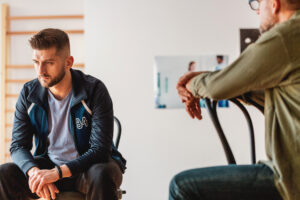If you’ve recently experienced a motorcycle accident, let me start by saying that I empathize with the emotional turmoil you may be going through. Recovering from such a traumatic event can be a daunting and challenging journey, but rest assured, you’re not alone. In this blog post, I want to share with you essential steps to emotionally recover through counseling after a motorcycle accident. As a personal injury lawyer, I’ve witnessed firsthand the tremendous impact these accidents can have on the mental well-being of those involved. Through counseling, you can find guidance, support, and healing to regain control of your life and move forward with confidence. So, let’s delve into these vital steps that will pave the way to emotional recovery and help you navigate this difficult time.
Understanding the Grieving Process After a Motorcycle Accident
Counseling after a motorcycle accident can be an essential aspect of the grieving process. As a personal injury lawyer, I understand the challenging experience individuals go through following such an incident. It is crucial to have the right support system and resources to navigate this difficult time. Engaging in counseling sessions can offer valuable assistance in addressing the emotional and psychological effects associated with a motorcycle accident. Professional counselors specialize in helping individuals cope with trauma and grief, providing a safe space to express feelings, fears, and insecurities. They can offer valuable insights and coping strategies for managing the aftermath of the accident. Moreover, counselors can assist in identifying any symptoms of post-traumatic stress disorder (PTSD) that may arise after the incident. Through counseling, individuals can gain a better understanding of their emotions, develop healthy coping mechanisms, and gradually heal from their devastating experience. Therefore, seeking counseling services after a motorcycle accident is an important step towards recovery and rebuilding one’s life.
Counseling after a motorcycle accident can be an instrumental part of the recovery process. Understanding the different stages of grief associated with such a traumatic event is essential. These stages, which include shock, denial, anger, depression, and eventually coming to terms with what has happened, can be addressed and managed through counseling. During the shock phase, individuals may struggle to process the magnitude of the accident. Denial may follow, as they find it difficult to accept the reality of the situation. Feelings of anger may arise, whether directed at oneself, others involved, or even at the circumstances. Following this intense emotional rollercoaster, individuals may experience depression, as they grapple with their new reality and the impact it has had on their lives. However, through counseling, individuals can receive support and guidance to navigate these complex emotions. A skilled counselor can provide strategies for coping with and understanding these stages, ultimately helping individuals come to terms with what has happened. Counseling offers a safe space to express feelings and concerns, providing valuable tools to heal emotionally and move forward in the recovery process after a motorcycle accident.
Thereafter, seeking counseling after a motorcycle accident can be immensely valuable in aiding individuals as they navigate the complex emotions and challenges that accompany their grief. Access to professional counseling services is crucial in providing the necessary guidance and support throughout each stage of the grieving process. It is imperative to find a therapist who specializes in helping people cope with traumatic events such as this one. Their expertise can assist in addressing the unique needs and concerns that may arise from experiencing a motorcycle accident. By partnering with a skilled counselor, individuals can find solace and develop effective coping mechanisms to reclaim their emotional well-being and move forward on the path to recovery.
Exploring Therapeutic Approaches to Emotional Recovery
When seeking emotional recovery after a traumatic event such as a motorcycle accident, exploring the various therapeutic approaches available in counseling is essential. This process can greatly assist individuals struggling with mental health conditions to find the treatment that works best for their specific needs. Counseling after a motorcycle accident offers a supportive and empathetic space for victims to address the emotional toll they may have experienced, providing them with the necessary tools to cope and heal. There are several therapeutic approaches within counseling that can be beneficial in this situation, including cognitive-behavioral therapy (CBT), eye movement desensitization and reprocessing (EMDR), and group therapy. CBT helps individuals to identify and modify negative thought patterns and behaviors, promoting positive coping strategies. EMDR focuses on processing and resolving traumatic memories to reduce their emotional impact. Group therapy provides a supportive environment where individuals can connect with others who have had similar experiences, fostering a sense of understanding and shared healing. Ultimately, exploring these different therapeutic approaches in counseling after a motorcycle accident can empower victims in their journey towards emotional recovery and overall well-being.
As a personal injury lawyer, I understand the significance of counseling when it comes to emotional recovery. Developing an understanding of which approaches are most effective for different conditions is essential in helping individuals identify potential solutions to any issues they may be facing. In the field of counseling, it is crucial to recognize that each individual’s circumstances are unique, and therefore, tailor-made solutions are often required. By delving into various therapeutic approaches, counselors can better assess which methods will be the most helpful for their clients. This could involve techniques such as cognitive-behavioral therapy, solution-focused therapy, or mindfulness practices. Additionally, it is vital to consider the specific condition or challenge faced by an individual to determine the most effective counseling approach. For example, someone suffering from post-traumatic stress disorder may benefit from trauma-focused therapy, while someone dealing with depression may respond well to interpersonal therapy. Ultimately, by appreciating the relevance of various counseling approaches, we can ensure that those seeking emotional recovery receive the necessary support tailored to their unique circumstances.
Moreover, in the context of counseling, it is crucial to commit to and follow the most effective approach identified. By staying dedicated and working through the chosen method, individuals can increase their chances of achieving the desired outcomes and embarking on their journey of emotional recovery. Whether it involves cognitive-behavioral therapy, psychoanalysis, or other techniques tailored to personal needs, sticking with the recommended approach allows for a solid foundation to be established. This commitment showcases one’s determination to overcome challenges and promotes a sense of responsibility towards personal healing. Consequently, individuals can gradually regain control over their emotions and regain a positive sense of self. Therefore, identifying and adhering to the best counseling approach is an essential step toward achieving emotional well-being and an important milestone on the path to recovery.
Building Coping Strategies for Long-Term Trauma Resolution
When it comes to long-term trauma resolution, counseling has proven to be an invaluable tool in assisting individuals in developing resilient coping strategies. In the realm of counseling, cognitive behavioral therapy (CBT) specifically showcases its efficacy in aiding people to recognize and confront detrimental thought patterns that frequently contribute to distress and other adverse symptoms. By targeting these unhealthy mental patterns, CBT empowers individuals to actively challenge and ultimately reframe their thoughts, leading to a more positive and adaptive mindset. This therapeutic approach not only equips individuals with the necessary skills to navigate their trauma but also helps them build a foundation for long-term healing and growth. Through counseling, individuals can harness the power of CBT and other evidence-based techniques to overcome the challenges associated with trauma, enabling them to reclaim their lives and forge a brighter future filled with resilience and hope.
Thereafter, counseling after a motorcycle accident can be highly beneficial in helping individuals regulate their emotions effectively and understand the source of their trauma. Through counseling, individuals can identify what triggers certain emotional responses, gaining a clearer understanding of their own emotional patterns. Armed with this knowledge, they are better equipped to develop healthy coping strategies that will not only benefit them in the short-term but also in the long-term. By working with a counselor, individuals can learn techniques to manage any feelings of anxiety, depression, or anger that may arise as a result of the accident. Through counseling, they can also gain insight into the impact of the accident on their mental well-being, allowing them to address any unresolved trauma and move towards healing and recovery. Overall, counseling plays a crucial role in assisting individuals to navigate the aftermath of a motorcycle accident and establish a strong foundation for their future well-being.
Utilizing Counseling as a Tool to Move Forward With Life
Counseling after a motorcycle accident can be an incredibly valuable resource for individuals looking to move forward in life. This powerful tool offers a wide range of benefits and can provide the necessary tools and strategies to better understand the challenges and emotions associated with such traumatic events. By seeking counseling, individuals have the opportunity to gain a deeper understanding of their own experiences, allowing them to navigate through the aftermath of a motorcycle accident more effectively. Counselors can assist in developing effective coping strategies specifically tailored to each individual’s unique circumstances, helping them to overcome any emotional or psychological hurdles that may arise. Furthermore, counseling can offer support and guidance during the healing process, promoting personal growth and resilience. Overall, when it comes to recovery following a motorcycle accident, counseling plays a crucial role in providing the necessary resources and support needed for individuals to regain control of their lives and move forward in a positive and empowered manner.
Counseling after a motorcycle accident can provide individuals with the clarity needed to make conscious decisions that align with their values, beliefs, and goals. This crucial step ultimately leads to increased self-awareness and confidence in taking action towards desired outcomes. Attending counseling sessions can be immensely helpful for those who have experienced a motorcycle accident and are seeking guidance in their healing process. By engaging in counseling, individuals can explore their emotions, thoughts, and fears in a safe and supportive environment. This process allows them to gain a deeper understanding of their traumatic experience and its impact on their well-being. Additionally, counseling can provide effective coping mechanisms to deal with any psychological or emotional distress that may arise following the accident. As a personal injury lawyer, I encourage my clients to consider counseling as part of their recovery journey, as it can greatly contribute to their overall well-being and assist in navigating the legal process. By addressing the emotional aspects of their experience, individuals can better prepare themselves to make informed decisions regarding their legal rights and seek the compensation they deserve. Overall, counseling after a motorcycle accident can be a valuable resource in helping individuals regain control over their lives and move forward with confidence.
In conclusion, counseling after a motorcycle accident proves to be an invaluable resource for individuals seeking emotional and mental healing. The process not only provides the support of a trusted professional but also offers an objective listening ear that can help identify potential barriers or roadblocks hindering our path to joy and fulfillment. Particularly in the context of a motorcycle accident, counseling serves as a vital tool for personal growth, helping us navigate through the trauma and challenges that arise from such an unfortunate event. By addressing the emotional and psychological impact of the accident, counseling empowers individuals to reclaim their lives, find closure, and move forward with a renewed sense of purpose. Therefore, it is highly recommended that anyone who has experienced a motorcycle accident seeks counseling promptly, ensuring their overall well-being and facilitating a smoother recovery journey.
Counseling and mental health therapy can be costly. Fortunately, we can often get compensation for therapy, counseling, and other mental health services after a motorcycle accident. Contact us today at 1-800-MOTORCYCLE to learn more about how we can help you with counseling and mental health recovery costs.
Call or text 1-800-668-6729 or complete a Free Case Evaluation form



